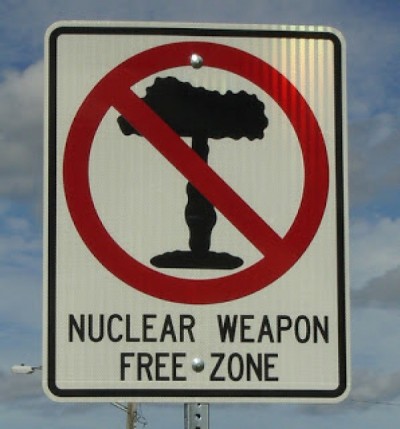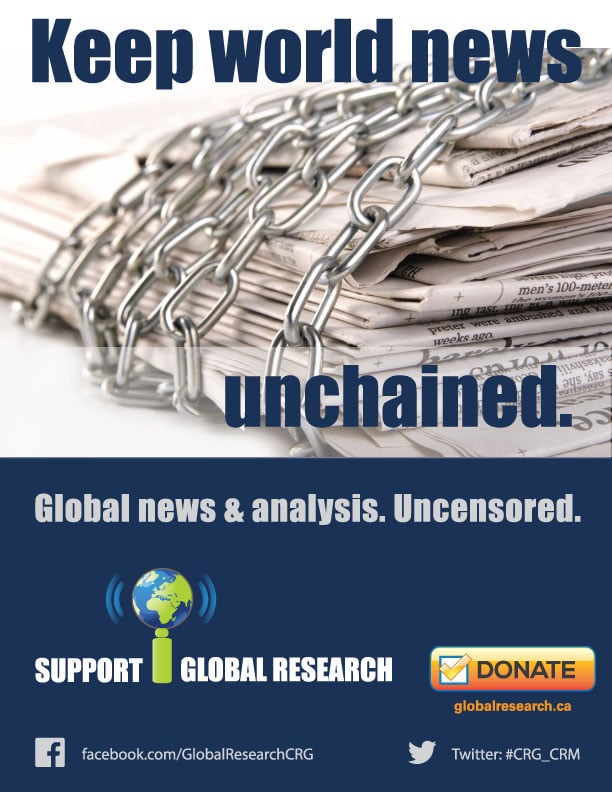Russia-US Summit Should Lead to Action on Earth-defining Issues. Disarming Their Respective Doomsday Machines
Unlike the US, Russia faces severe threats along its frontiers.

Note to readers: please click the share buttons above
In an ideal world, the Russia-United States summit in Helsinki would have focused primarily on taking concrete steps towards disarming their respective Doomsday Machines. That is, Russia and America’s thousands of nuclear weapons which today remain pointed at each other, on hair-trigger alert.
Should Vladimir Putin and Donald Trump agree to implement guarantees in eliminating their vast nuclear stockpiles, it would likely lead to the end of this unprecedented threat to the globe. For instance, Israel would surely be compelled to follow its master’s lead in abolishing their own arsenal, thereby resulting in a nuclear weapons free zone in the Middle East (Pakistan and India lie in South Asia). The nuclear Nonproliferation Treaty, the most important disarmament agreement, is contingent upon dismantling nuclear weapons in the Middle East – one of the most volatile regions on earth.
As the growing bulk of evidence demonstrates, it is miraculous the human race has survived over 70 years into the nuclear age. There is no justifiable reason in continuing to allow the presence of nuclear weapons on earth. Yet the fact they still cast their shadow over the planet, like a great Grim Reaper, encapsulates the madness of the species.
The unfortunate human tendency to continue the unending advancement of technology led scientists to develop the atomic bomb in 1945, despite the obvious risks to our own species and the earth. Recently, in early 2018, president Trump told reporters,
“We’re going to have the strongest military we’ve ever had before” including “a brand new nuclear force. We will always be number one in that category [nuclear weapons], certainly as long as I’m president. We’re going to be far, far in excess of anybody else”.
Trump’s intentions regarding nuclear weapons were clear from early on. Six weeks after his election victory, Trump set the tone when writing that,
“The United States must greatly strengthen and expand its nuclear capability, until such time as the world comes to its senses regarding nukes”.
Flying in the face of various treaties, the plan is for a $1.2 trillion “modernization” of the US nuclear arsenal over the next 30 years. The purpose being that America can remain as Trump stated early this year, “so far ahead of everybody else in nuclear like you’ve never seen before”.
Placed in context, even such hawkish figures as former US Secretaries of State, Henry Kissinger and George Shultz, have outlined that nuclear weapons should be wiped from the earth. This cannot be achieved unless America, the world’s strongest military power by far, takes the lead in outlining steps to begin immediate nuclear disarmament, with Russia – inevitably followed by China and others – tied down to such an agreement.
Unlike the US, Russia has genuine security concerns combined with other ancient historical fears. Thousands of troops from the US-led NATO, an increasingly antagonistic military alliance now comprising 29 states, have poured forward near (or onto) Russia’s borders in eastern Europe and the Baltics. This is in stark violation of agreements issued following German reunification in 1990, that NATO would move “not one inch eastward”, i.e. into eastern Germany. It led Putin to justifiably claim in 2014 that the West “have cheated us again and again, made decisions behind our back, presenting us with completed facts”.
NATO’s pretext for existence, to defend Europe against “the hordes from the East”, fell to pieces following the USSR’s demise in 1991. Rather than NATO being disbanded, the opposite occurred, revealing its true intentions. The organization was immediately expanded eastward, and has since become a global US-run intervention force, committing war crimes and other depredations.
In Europe, the route that thousands of NATO troops have taken follows a similar path to the Napoleonic buildup to Russia’s frontiers in 1812. This was replicated almost 130 years later by the huge Nazi invasion.
The unprecedented human sacrifices in defeating the two “great conquerors” in modern history (Napoleon and Hitler) must be permanently embedded upon the Russian psyche. The Hitlerite and Napoleonic forces were, on both occasions, the largest collection of armies in world history – with about 680,000 French-led units attacking Russia in June 1812. This was followed in June 1941 by Operation Barbarossa, as 3.2 million German soldiers poured eastward along a vast frontier, bolstered by around 600,000 troops from Hitler’s Axis allies and client states. As a result, one can at least understand the Russian dependence upon nuclear weapons, as a deterrent against yet another potential invasion from the West, along with other threats.
For the US, the excuses are somewhat thinner. The 11 September attacks of 2001 were the first assaults on America’s mainland since the War of 1812, fought between the US and then bitter enemy, the United Kingdom. Even at that, the War of 1812 was a skirmish by comparison to Napoleon’s attack on Russia that same year. For the past two centuries the US has enjoyed unmatched security, while Russia (and Europe) have fought two horrendous world wars along their territories.
As Russia continues to be provoked, on the far side of the Atlantic there are of course no Kremlin-led formations amassing south of the border in Mexico, or northwards along the Canadian frontier. Even were there, any Russian-affiliated forces would soon be “terminated with extreme prejudice” to borrow the old CIA phrase. There is little reference to these massive disparities in mainstream dialogue, which supports the premise that the US can do as it pleases. Adopting this ideological mindset, it seems perfectly normal for American red lines to be situated along Russia’s boundaries, and thousands of kilometers away near the Chinese mainland in eastern Asia.
These strategies, epitomized by NATO, continue to increase the risk of a terminal nuclear war erupting, which the world has already been blessed to escape. Quite revealingly, NATO’s planet-threatening policies have long enjoyed significant backing from corporate-owned media, who instead cast Russia as the great villain. Such are the concerns of the “Free Press” (the business press) for the welfare of its readers, along with that of the wider world. Indeed, there is barely a note of warning to be heard regarding the unparalleled menace of nuclear weapons, which is pretty remarkable in itself.
Climate change, the other defining world issue, has received slightly more mainstream coverage, which does not say an awful lot. Unrestricted climate change, mainly as a result of astonishing government inaction (led by the US), is already posing a dire prospect for humans and the earth. Climate change is currently being felt most severely by those contributing the least to the problem: Such as in the poorest countries like Haiti, Mozambique and Honduras. These uncomfortable facts are carefully avoided in establishment circles.
People fleeing poverty-stricken nations should be welcomed (with open arms) by the rich states responsible for producing the greatest carbon emissions, such as the US. Sadly, this is anything but the case, embodied by Trump himself saying in January, “Why are we having all these people from sh*thole countries coming here?”
In the meantime, should current trends persist, “dangerous climate change” severely affecting the entire globe is expected to be unleashed in two decades or less, according to Ireland’s long-time leading climate scientist, John Sweeney. Uncontrollable, and unknown, implications are forecast beyond this approximate time-span. Sweeney believes that,
“We have to climate-change proof society for the years ahead. It won’t cost the earth to do it; it will cost the earth not to do it”.
Yet the nuclear threat surely remains both greater and more imminent, as has been the case for a long time. A nuclear war between the US and Russia would bring about a far swifter end for humans (and many other species) – as proven by environmental scientists who discovered the global extinction phenomenon, “nuclear winter”, in the early 1980s.
Rather than focusing on these critical issues, the corporate-run media have performed a leading role in shifting focus towards anti-Russian sentiments – Russophobia – by seeking to link Moscow to Trump’s election victory, among other factors. By little coincidence, this has continued abreast to the Russia-US summit in Finland. The ongoing attempts in tying Putin to Trump’s election victory are underhanded at best.
It enters the realms of grotesquery when examining how consecutive US administrations, post-1945, have overthrown governments across the world; in repeated cases, instituting military dictatorships. The continued ramping up of ill-feeling against Russia, by Western media and military-industrial complex, also further raises the possibility of nuclear war breaking out – another sign of the insanity of our times. Tensions with Russia should be reduced by exploring diplomatic paths and negotiation, preferably beginning with the Russia-US summit.
*
Shane Quinn obtained an honors journalism degree. He is interested in writing primarily on foreign affairs, having been inspired by authors like Noam Chomsky. He is a frequent contributor to Global Research.
 Can you help us keep up the work we do? Namely, bring you the important news overlooked or censored by the mainstream media and fight the corporate and government propaganda, the purpose of which is, more than ever, to “fabricate consent” and advocate war for profit.
Can you help us keep up the work we do? Namely, bring you the important news overlooked or censored by the mainstream media and fight the corporate and government propaganda, the purpose of which is, more than ever, to “fabricate consent” and advocate war for profit.
We thank all the readers who have contributed to our work by making donations or becoming members.
If you have the means to make a small or substantial donation to contribute to our fight for truth, peace and justice around the world, your gesture would be much appreciated.

